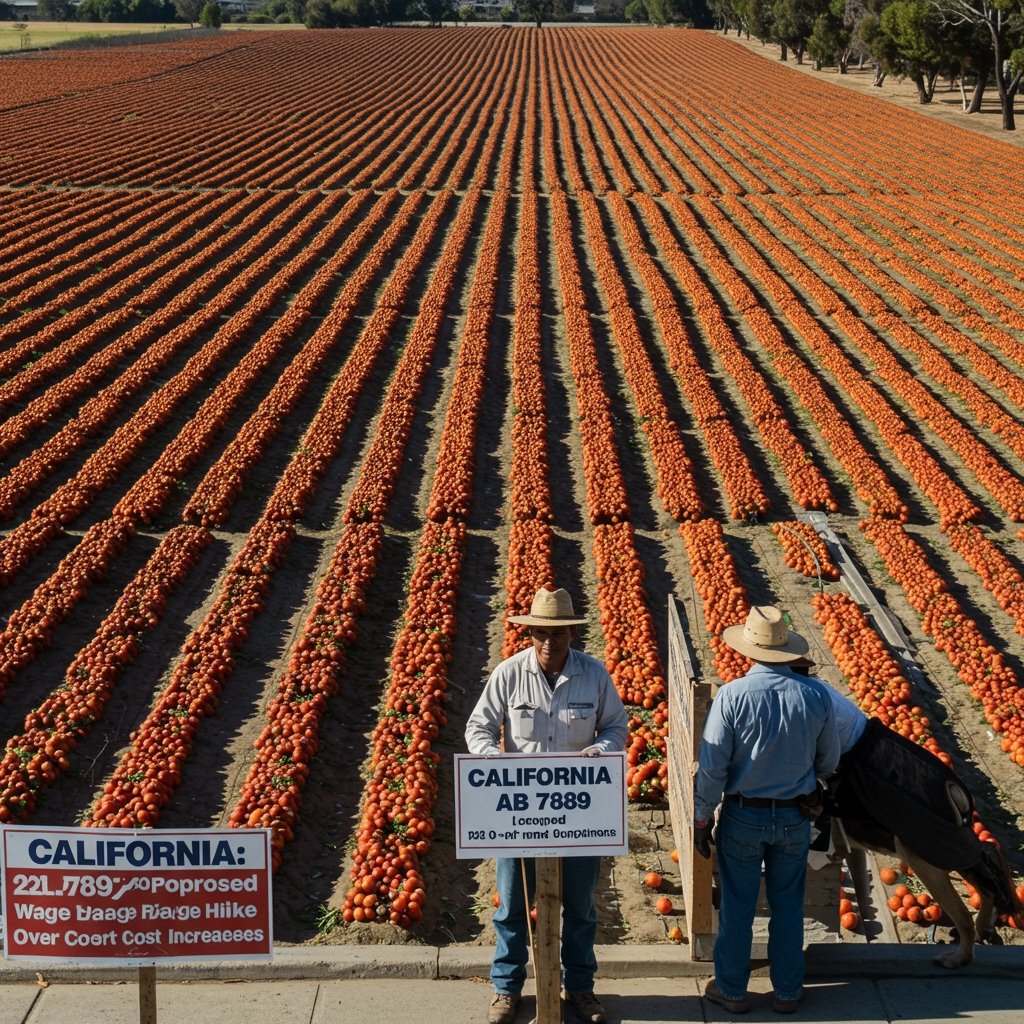California Assembly Bill 789 Proposes Significant Changes for Farm Workers
The California State Assembly is currently the focal point of a significant legislative debate with the introduction of Assembly Bill 789. Championed by Representative Maria Sanchez, this proposed legislation seeks to enact substantial changes to the compensation and working conditions of the state’s large agricultural workforce. At its core, AB 789 proposes a phased 25% increase in the minimum wage specifically for agricultural workers, planned to roll out over a two-year period, commencing in 2026. Beyond the base wage hike, the bill also aims to adjust the framework for overtime pay by seeking to lower the daily overtime threshold, a measure designed to ensure fairer compensation for hours worked beyond a standard workday.
This legislative effort arrives amidst ongoing discussions about the welfare of farm laborers, who perform physically demanding work often under challenging conditions to cultivate and harvest the produce that feeds communities across the state and nation. Proponents argue that current wage levels are insufficient to support families in California’s high cost of living environment, and that existing overtime rules do not adequately compensate workers for long hours frequently required during peak seasons.
Provisions of Assembly Bill 789
Assembly Bill 789 lays out a specific plan for increasing the economic stability of farmworkers. The headline provision is the mandated 25% increase in the minimum wage for this specific sector. This increase is not intended to be immediate or applied in a single step; rather, the bill stipulates that the raise will be phased in incrementally over the course of two years. The effective date for the start of this phased increase is set for 2026, providing growers and agricultural businesses with some lead time to prepare for the change.
In addition to the base wage increase, AB 789 addresses the issue of overtime pay. The bill proposes to lower the daily threshold at which overtime pay begins for agricultural workers. This change aims to align the overtime rules more closely with those in other industries, potentially resulting in higher overall earnings for workers who frequently work extended hours during the harvest season or other labor-intensive periods. Currently, state law has different overtime rules for farmworkers compared to many other employees, and this provision seeks to modify that structure to the benefit of the laborer.
Advocate Perspectives: A Call for Fair Compensation
The introduction of Assembly Bill 789 has been met with strong support from labor organizations advocating on behalf of farmworkers. The United Farm Workers union, a prominent voice for agricultural laborers in California, has publicly lauded the proposed legislation. The union views AB 789 as a critical and vital step towards ensuring fair compensation and significantly improved working conditions for the estimated 750,000 farm laborers who form the backbone of California’s agricultural industry.
According to the United Farm Workers, many farmworkers currently earn wages that place them below the poverty line, struggling to afford basic necessities like housing, food, and healthcare, particularly given California’s high cost of living. They argue that the physically taxing nature of farm work, often performed in extreme temperatures and involving repetitive motions and heavy lifting, warrants compensation that reflects the difficulty and essential nature of the job. The union contends that a 25% wage increase, even phased, would provide a much-needed boost to these workers’ economic security, enabling them to better support their families. Furthermore, lowering the daily overtime threshold is seen as a measure of basic fairness, ensuring that workers are appropriately compensated for time spent working long days, which are commonplace in agriculture. Proponents emphasize that investing in the well-being of farmworkers is not only a matter of social equity but also contributes to a more stable and motivated workforce, ultimately benefiting the entire agricultural ecosystem.
Industry Concerns and Projected Economic Impacts
While labor advocates celebrate the potential benefits of AB 789, the proposed bill has simultaneously ignited significant concern and opposition within the agricultural industry. The California Farm Bureau Federation, a leading organization representing farmers and ranchers across the state, has voiced strong reservations about the potential economic consequences of the legislation.
The Farm Bureau projects that the mandates included in Assembly Bill 789, specifically the combination of a 25% wage increase and the lowering of the daily overtime threshold, could lead to a substantial increase in labor costs for growers. Their analysis suggests that for some agricultural operations, the cumulative effect of these changes could result in labor costs rising by as much as 30%. Given that labor is often one of the largest expenses for farms, particularly those growing labor-intensive crops, a cost increase of this magnitude is viewed as a significant threat to the financial viability of many operations.
Industry representatives argue that California farmers already face numerous challenges, including drought, water restrictions, fluctuating commodity prices, global competition, and increasing regulatory burdens. Adding a significant, mandated increase in labor costs, they contend, could push many farms to the brink. The California Farm Bureau Federation warns that growers may be forced to adopt various strategies to absorb or mitigate these rising costs. These could include investing more heavily in automation to reduce reliance on manual labor, shifting cultivation away from labor-intensive crops like berries and leafy greens towards less demanding alternatives, reducing the total acreage planted, or in some cases, potentially ceasing operations altogether.
A key concern highlighted by the Farm Bureau is the potential impact on consumer prices. They argue that increased production costs for farmers will inevitably be passed down the supply chain, potentially leading to higher prices for consumers at the grocery store, particularly for state-grown produce such as fresh berries and leafy greens, which require significant manual labor. This could make California produce less competitive compared to imports or produce from states with lower labor costs. The industry’s position emphasizes that while supporting farmworker welfare is important, the approach taken by AB 789 could inadvertently harm the very industry that provides these jobs, potentially leading to unintended negative consequences for both growers and consumers.
Legislative Process and Upcoming Hearing
Assembly Bill 789 is now entering a crucial stage of the legislative process. Following its introduction by Representative Maria Sanchez, the bill was assigned to relevant committees within the Assembly for review and debate. This committee stage is a critical juncture where the bill’s merits, potential impacts, and various perspectives are examined in detail. Experts, stakeholders, and the public typically have the opportunity to provide testimony during committee hearings.
A significant milestone in the bill’s journey through the California Assembly is scheduled for February 20th. On this date, Assembly Bill 789 is slated for a crucial committee hearing. This hearing will provide a platform for proponents, like the United Farm Workers, and opponents, such as the California Farm Bureau Federation, to formally present their arguments, data, and concerns to the legislators who will ultimately decide whether the bill should advance further in the legislative process. The outcome of this hearing will be a strong indicator of the bill’s prospects for passage through the Assembly and potential consideration by the State Senate. The debate is expected to be robust, reflecting the deep divisions and high stakes involved for California’s agricultural sector and its workforce.
Broader Implications for California Agriculture
The debate surrounding Assembly Bill 789 underscores the complex balance California seeks to strike between supporting a vital agricultural economy and ensuring equitable treatment for its workforce. California is the nation’s leading agricultural state by value, producing a vast array of crops that contribute significantly to both the state and national food supply. This production relies heavily on a large, predominantly immigrant labor force, whose working conditions and wages have historically been subjects of debate and activism.
Legislation like AB 789 has implications that extend beyond the direct impact on wages and labor costs. It touches upon issues of food security, rural economic development, consumer affordability, and the state’s commitment to labor rights. The outcome of the legislative process for AB 789 will not only shape the future economic landscape for farmworkers and growers but may also influence policy discussions in other states with large agricultural sectors.
Conclusion
As Assembly Bill 789 moves forward towards its crucial committee hearing on February 20th, the debate over its potential impacts intensifies. Proponents argue passionately for the necessity of the wage increase and overtime changes to lift farmworkers out of poverty and acknowledge the dignity of their labor. Opponents warn of severe economic repercussions for the state’s agricultural industry, potentially leading to farm closures, reduced production, and higher costs for consumers. The California legislature is faced with the challenge of weighing these competing interests to determine the future regulatory framework for one of the state’s most essential workforces. The upcoming hearing represents a key moment in this ongoing deliberation.


















